
Bret Schipper, M.D. scrubs at a wash station outside an operating room at Hartford Hospital. Photo by Chris Rakoczy.
Hartford HealthCare hospitals return to a full surgical schedule, aided by quick-turnaround COVID-19 testing by The Jackson Laboratory.
Surgeon Bret Schipper is glad to have a full schedule of operations ahead of him this week. Schipper is the chief of surgical oncology for Hartford HealthCare’s Hartford and central regions, which includes hospitals in Hartford, New Britain and Meriden, Conn., and the director of oncologic surgery for the system’s cancer institute. Until recently, he and fellow surgeons had operated on only the most critical cases at the height of the COVID-19 pandemic.
“We've come a long way in our journey over the last months,” says Schipper. “Initially, when the virus first hit, we quickly decided what surgeries should continue, and what surgeries could wait. We triaged surgical procedures across all specialties, designating them as elective, urgent or emergent, and really stopped all elective surgeries to preserve resources and ICU beds, and to prevent infection.”
“The key to getting back on track,” says Ajay Kumar, M.D., MBA, Hartford HealthCare’s executive vice president and chief clinical officer, “is managing logistical challenges: organizing and optimizing our capabilities to manage the pandemic while simultaneously delivering other needed services in the safest possible way for our patients and employees.”
This means not only revising hospital processes and treatment protocols in light of the pandemic, Kumar says, “but also streamlining the communication of vital information to our 30,000 employees over 400 access points in Connecticut, Massachusetts and Rhode Island.” Kumar’s team set up a 24-hour call center providing resources and support to employees, from dealing with the stress of caring for COVID-19 patients to coordinating childcare. “Our capabilities were tested to the maximum extent. But, I'm so proud of our organization because we have moved through the phases of the pandemic and effectively transitioned into recovery.”
Today, Kumar reports, the healthcare system is back to almost full treatment capacity, including surgeries; in fact, the orthopedic surgery unit is currently conducting more operations per week than before the pandemic.
Kumar and his team acknowledged that the ability to test for COVID-19 would be essential at every step in their evolving protocols, but there was already a significant shortfall in testing capabilities across the country. That was when Charles Lee, Ph.D., professor and scientific director of The Jackson Laboratory (JAX) for Genomic Medicine in Farmington, Conn., reached out to Kumar to offer help in the form of COVID-19 testing. “We’re really grateful for the partnership with JAX,” Kumar says.

Ajay Kumar, M.D., MBA, Hartford HealthCare's executive vice president and chief clinical officer, greets staff before the pandemic. Photo by Rusty Kimball.
Worldwide surgical backlog
When the COVID-19 pandemic first emerged in early 2020, hospitals’ top concerns were preventing the virus from spreading to patients and staff, and providing sufficient beds for a possibly massive influx of cases. To reduce the risk of infection and to manage shortages in personal protective equipment, most hospitals drastically cut back on surgeries.
By the end of May, some 28 million elective surgeries had been delayed worldwide due to COVID-19. Months later, many hospitals are dealing with a second-wave crisis: the backlog of surgeries.
According to a recent study in the Harvard Business Journal, most states in the U.S. enacted a temporary ban on elective surgery from March through May 2020. “The ‘elective’ in elective surgery is largely a misnomer,” the study’s authors note. “While ‘elective’ implies optional, most elective surgical cases fall somewhere between vital preventative measures (e.g., screening colonoscopy) and essential surgery (e.g., cataract removal). Ample literature across surgical specialties demonstrates worse patient outcomes and higher costs when these treatments are delayed.”
Testing, testing
Schipper recounts, “Everything came to a grinding halt for the most part, aside from the most urgent of procedures that couldn't wait. That required us to think outside the box with regard to patient management, and we began to use other nonsurgical options to get patients through that time. We also began to think about how we were going to plan for the return of surgery in a safe and efficient manner.”
This included setting up drive-through COVID-19 testing locations throughout the Hartford HealthCare system where, Schipper says, “pre-operative patients drive through a tent and get swabbed while sitting in their car, and then go on their way without exposing themselves to a hospital or other places.” Pre-surgical COVID-19 testing is essential, Schipper says, “to prevent risk of spread to our staff and also to protect the patients, because the data showed that you had a higher chance of complication if you were positive for COVID-19.”
At first, though, test results were taking five to ten days. In that amount of time, a patient who is negative on the day of the test may become exposed to the virus before the results are in, and ill by the time he or she is scheduled for surgery.
In making the shift to JAX for pre-procedural testing, Schipper admits, “I was nervous, having worked with other labs to maximize testing efficiency, but we worked with the JAX team to create a smooth workflow. Then came the day when, ‘Okay, this morning at 6:00 AM, all preoperative pre-procedural testing is now going to go to JAX.’ I held my breath for a minute because so much weight is on these tests. If something goes wrong with the test and surgery has to be canceled at the last minute, it's a big deal for the hospital, for the patients, for everybody.”
Now, he says, “with our process with JAX, we're able to get results on our preoperative patients back in about 14-24 hours, which has really been a game changer for us, and a great win for the process of preoperative testing.”
COVID-19 and its aftermath in children
Connecticut Children’s is partnering with The Jackson Laboratory for virus testing and research into a post-viral immune syndrome.
Read moreSacramento doctor puts JAX employees to the test
When The Jackson Laboratory made the decision to implement a phased return to onsite work for remote employees, COVID-19 testing was at the heart of its plan.
Read moreProtecting West Hartford's first responders
Rapid COVID-19 testing at The Jackson Laboratory for Genomic Medicine is keeping West Hartford fire, rescue, and EMT teams healthy so they can safely help others.
Read moreLife-preserver: COVID-19 testing to keep Maine Maritime students safe
As the academic year starts up across the country, The Jackson Laboratory has partnered with a variety of educational institutions, including Maine Maritime Academy, to provide COVID-19…
Read moreHelping the living in a pandemic
How COVID-19 testing by the Connecticut Medical Examiner's office supports public health.
Read moreProtecting seniors during the pandemic
Coordinated COVID-19 testing at a Connecticut long-term care complex aims to prevent infection among the elderly and staff.
Read morePerspective: On the front lines of COVID-19 testing
Rachel Goldfeder is a JAX computational scientist who has taken on the role of project manager for the JAX COVID-19 CLIA Lab testing team.
Read more